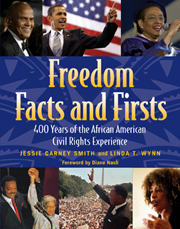1770
Crispus Attucks (c. 1723-70)
The first black casualty in the American Revolution was Crispus Attucks (c. 1723-70). He was not enlisted in an army but instead was part of a Boston group protesting the Townshend acts. Tensions in Boston were already high when Attucks and his companions, who are said to have come from the Boston docks, approached the British garrison. While protesting at the garrison housing the British soldiers who were to enforce the acts, Attucks and several others were shot. This event came to be known as the Boston Massacre and is considered to have triggered the American Revolution. The details of Attucks' early years are not well known. It is believed that he was of African and Native American ancestry, that his father was a slave, and that the family lived in Framingham, Massachusetts. He is also identified as a merchant seaman. Further speculation, based on a 1750 advertisement in the Boston Gazette, identifies Attucks as a runaway slave. However, historians are more definite about placing him in Boston in 1770. The Crispus Attucks Monument, in honor of the victims, was dedicated in the Boston Commons in 1888.
Sources: Jet 91 (10 March 1997):19; 95 (8 March 1999): 19; Smith, Notable Black American
Men, pp. 40-42.
From Black Firsts: 4,000 Ground-Breaking and Pioneering Events
by Jessie Carney Smith, © 2013 Visible Ink Press®. A celebration of achievement, accomplishments and pride.
Dig deeper with these related titles:
 |
Black Firsts: 4,000 Ground-Breaking and Pioneering Events, Third Edition
by Jessie Carney Smith, Ph.D.
Achievement engenders pride, and the most significant accomplishments involving people, places, and events in black history are gathered in Black...
Read More »
|
ISBN: 9781578593699
$34.95
|
 |
African American Almanac: 400 Years of Triumph, Courage and Excellence
by Lean'tin Bracks, PhD
A wealth of milestones, inspiration, and challenges met. . .
The most complete and affordable single-volume reference of African...
Read More »
|
ISBN: 9781578593231
$29.95
|
 |
Freedom Facts and Firsts: 400 Years of the African American Civil Rights Experience
by Jessie Carney Smith, Ph.D. and Linda T Wynn
Spanning nearly 400 years from the early abolitionists to the present, this guide book profiles more than 400 people, places, and events that have...
Read More »
|
ISBN: 9781578591923
$44.95
|
 |
Black Heroes
by Jessie Carney Smith, Ph.D.
"If there is no struggle, there is no progress," wrote Frederick Douglass. "This struggle may be a moral one; or it may be a physical one; or it may...
Read More »
|
ISBN: 9781578591367
$69.95
|








